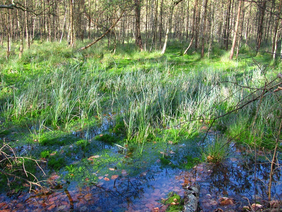Around 5% of Germany's greenhouse gas emissions come from drained moors. In order to achieve Germany's climate protection goals, it is therefore necessary to rewet moor soils, which also has further positive effects and promotes the protection of biodiversity, among other things. Against this background, the Federal Government is striving to draw up a Federal Moor Protection Strategy and to implement the first measures before the end of this legislative period. In this context, the Federal Agency for Nature Conservation (BfN) has commissioned the IfLS to develop a technical basis as part of a research project.
In order to build on the current state of knowledge and ongoing discussions, a workshop was held on 2 and 3 September 2019 with experts from administration, science and associations dealing with various aspects of moor protection. The IfLS was entrusted with the preparation, implementation and follow-up of this workshop in Bonn.
Ms Nitsch (IfLS) first gave an overview of current fields of action and measures in moor protection. External impulse lectures highlighted the areas of water management and soil protection, nature conservation and biodiversity as well as moorland protection, especially on agricultural land. In four parallel working groups, existing and future challenges and starting points for moor protection were then discussed.
The results of the research and the workshop are currently being summarised in a report for the BfN. In a next step, priority topics will be identified, which will be further elaborated and for which a second expert workshop will take place in November.
Contact persons at IfLS: Heike Nitsch (nitsch[at]ifls.de) and Jörg Schramek (schramek[at]ifls.de)
